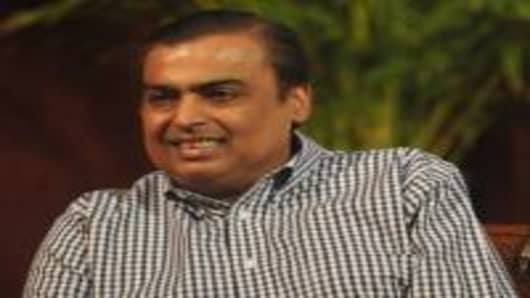Mukesh Ambani, India’s richest man, has called for a generational change in the country’s gerontocratic leadership, and urged the government to move faster to implement reforms that would help meet its young population’s economic ambitions.
“We’ve had a mystery [in India] where we think that [important] jobs can only be done by 60-year-old plus [people]... I think we’re now fast moving to say that our 40-year-olds can take more responsibility and can perform better,” Mr Ambani, 54, told business leaders and policymakers at the World Economic Forum’s India Economic Summit in Mumbai.
He added that moving towards “leadership [that] reflects our demographics”, should be a top priority for the country.
The tycoon’s call for younger leadership comes as 41-year-old Rahul Gandhi prepares to take greater responsibility in India’s ruling Congress party from his ailing mother Sonia, the party president, and as the country’s economy recedes from much-wanted double-digit growth.
Many political analysts are expecting an imminent transition of power in which Mr Gandhi – the scion of the Nehru-Gandhi dynasty – takes a more visible role following the treatment of his 64-year-old mother for an unknown illness in the US over the summer.
Some expect him to take the party’s presidency before crucial elections in Uttar Pradesh next year.
About 70 per cent of India’s 1.2 billion people are under 35. Mr Ambani’s call to “align leadership with demographics” is an appeal for greater dynamism in Asia’s third largest economy at a time when the administration of Manmohan Singh, the 79-year-old prime minister, is flagging. The opposition Bharatiya Janata party is led by the 83-year old L.K. Advani.
Likewise, some of its leading businesses, such as the Tata Group, are led by septuagenarians.
One of the top complaints of Mumbai industrialists, alongside high domestic borrowing costs, is paralysis in India’s parliament and bureaucracy following a slew of embarrassing high-profile corruption scandals.
Mr Singh and his top economic team were absent from the WEF, viewed as a key investment showcase held this year for the first time in India’s financial capital. Previously, Mr Singh has used the event to sell his country’s prospects to foreign investors.
Janmejaya Sinha, the chairman of the Boston Consulting Group in the Asia-Pacific region, said: “The government’s record in addressing the big issues is abysmal.”
“The issues are ethical not economic, but we keep saying it is an economic problem,” he said about New Delhi’s failure to push through improvements in education, healthcare and power.
Mr Ambani, the chairman of Reliance Industries, India’s largest family-controlled conglomerate by market capitalisation, emphasised that it was essential for the government to speed up reform to meet the demands of the fast growing private sector. “The reality is that India is a land of a billion opportunities and not of a billion problems,” he said.


